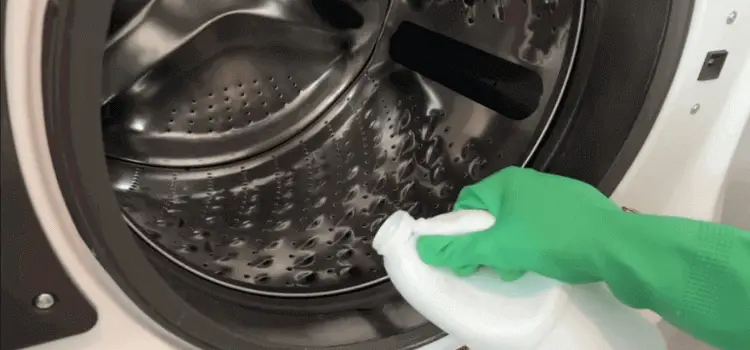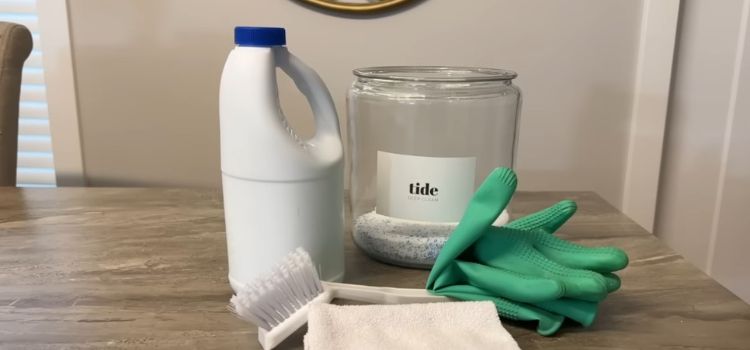To clean mold out of a washing machine, ensure the machine is empty and dry, put on protective gloves, and use a bleach-based mold cleaner to wipe away the black mold. Pay attention to the folds of the rubber seal and thoroughly clean them with the microfiber cloth.
Cleaning mold out of a washing machine is essential to prevent mold spores from contaminating your clothes and affecting your health. Mold can thrive in the moist and warm environment of a washing machine, and if left unchecked, it can lead to unpleasant odors and potential health risks.
Regular maintenance and cleaning of your washing machine are crucial to ensure its proper function and the cleanliness of your laundry. Here’s a comprehensive guide on how to effectively clean mold out of a washing machine, keeping it sanitized and safe for use.

Importance Of Cleaning Mold
Understanding The Risks Of Mold In Washing Machines
Mold in washing machines can lead to health issues and affect laundry quality.
Impact On Health And Laundry Quality
Mold growth in your washing machine can contaminate clothes and jeopardize your well-being.
Identifying Mold Growth
Mold growth in a washing machine can be a common problem, especially in front-loading machines. It is important to identify the signs of mold growth to address the issue promptly. By regularly inspecting your washing machine, you can prevent the growth of mold that can cause unpleasant odors and potentially impact your laundry.
Signs Of Mold In A Washing Machine
Recognizing the signs of mold growth in a washing machine is crucial to ensure proper cleaning and prevent its spread. A few common signs to observe:
- Musty odor: Mold often produces a distinct musty smell that can be easily noticeable.
- Dark spots: Black or dark-colored spots on the rubber seal or other parts of the machine can indicate the presence of mold.
- Visible growth: In some cases, you might be able to see mold growth on the surface of the washing machine.
If you notice any of these signs, it is important to take immediate action to clean and remove the mold from your washing machine.
Common Areas Where Mold Thrives
Mold tends to thrive in damp and dark environments. In a washing machine, there are certain areas that are more prone to mold growth. These include:
- Rubber door seal: The rubber seal around the door is a common area where mold can develop, as it can trap moisture and detergent residue.
- Detergent dispenser drawer: Mold can also accumulate in the detergent dispenser drawer, especially if it is not properly cleaned and dried after each use.
- Drain hose and filter: Moisture in the drain hose and filter can provide an ideal breeding ground for mold if not properly maintained.
Regularly inspecting and cleaning these areas can help prevent mold growth and ensure your washing machine remains clean and odor-free.
Preventative Measures
To clean mold out of a washing machine, begin with an empty and dry machine. Wear protective gloves and apply a bleach-based mold cleaner onto a microfiber cloth, ensuring to thoroughly wipe away black mold from the rubber seal. Alternatively, run an empty cycle with bleach to eliminate mold buildup.
Preventative Measures Regular maintenance to avoid mold growth To prevent mold growth in your washing machine, it’s crucial to implement regular maintenance.
1. Wipe down the rubber seal after each use to eliminate moisture and deter mold growth.
2. Run a cleaning cycle with hot water and a specified washing machine cleaner at least once a month.
3. Leave the door ajar between laundry loads to promote air circulation and prevent mold from thriving in a damp environment.
Tips for keeping your washing machine mold-free
Maintaining a mold-free washing machine includes simple but effective practices.
- – Use high-efficiency detergents: These front-load-specific detergents minimize soap residue, a source of mold growth.
- – Clean the dispensers regularly: Wipe down detergent and fabric softener dispensers to prevent mold buildup.
- – Inspect and clean the filter: Check the washing machine’s manual for instructions on how to locate and clean the filter, removing potential mold sources.
By implementing these preventative measures and maintenance tips, you can ensure your washing machine remains free from mold, promoting cleaner, fresher laundry results.
Cleaning Process
To clean mold out of a washing machine, start by spraying a bleach-based cleaner onto a microfiber cloth and wiping the rubber seal. Make sure to reach into the folds to remove the black mold. To prevent future mold growth, run an empty wash cycle with a cup of bleach at the highest water heat setting.

Materials Required For Cleaning:
- Protective gloves
- Bleach-based mold cleaner
- Microfiber cloth
Step-by-step Guide For Removing Mold:
- Ensure the washing machine is empty and dry.
- Put on protective gloves.
- Spray a small amount of bleach-based mold cleaner onto a microfiber cloth.
- Use the cloth to wipe away black mold, paying close attention to the rubber seal folds.
Using Bleach And Other Cleaning Agents Effectively:
To effectively remove mold from the washing machine, it is crucial to use bleach and other cleaning agents properly. When using bleach, always dilute it according to the manufacturer’s instructions and apply it carefully to target mold growth areas. Allow the cleaning agents to sit for the recommended time before wiping or rinsing them off for optimal results.
Additional Tips
While the previous section focused on the main methods for cleaning mold out of a washing machine, there are a few additional tips that can help you in your battle against mold. These tips include alternative methods for eliminating mold as well as maintenance tips to prevent future mold growth.
Other Methods For Eliminating Mold
If you prefer to use natural remedies or want to try different methods for eliminating mold from your washing machine, here are a few alternative options:
- Vinegar: Vinegar is a natural disinfectant that can help kill mold. Simply pour a cup of white vinegar into the detergent dispenser and run a hot water cycle. This will not only remove mold but also help keep your washing machine smelling fresh.
- Baking soda: Baking soda is another effective natural cleaning agent. Mix half a cup of baking soda with water to form a paste. Apply the paste to the affected areas of your washing machine, let it sit for a few hours, then scrub and rinse thoroughly.
- Hydrogen peroxide: Hydrogen peroxide is a strong mold killer. In a spray bottle, combine equal parts hydrogen peroxide and water. Spray the solution onto the affected areas and let it sit for about 15 minutes before wiping clean with a damp cloth.
Maintenance Tips To Prevent Future Mold Growth
Prevention is key when it comes to keeping mold out of your washing machine. Follow these maintenance tips to minimize the risk of mold growth:
- Keep the door open: After each use, leave the washing machine door open to allow air to circulate and dry out any moisture. This will assist in preventing the first formation of mold.
- Clean the detergent dispenser: Regularly remove and clean the detergent dispenser to prevent the buildup of residue and mold. Use a mixture of warm water and mild soap to clean the dispenser thoroughly.
- Wipe down the rubber seal: After every few uses, wipe down the rubber seal with a damp cloth to remove any debris or moisture that can promote mold growth.
- Run regular cleaning cycles: Run a cleaning cycle with hot water and bleach or a washing machine cleaner every few months to kill any lingering mold spores and keep your washing machine fresh and clean.
By following these additional tips, you can not only remove existing mold from your washing machine but also prevent future mold growth. This will help ensure that your washing machine stays clean and odor-free, allowing you to enjoy fresh and mold-free laundry every time.
Fact:
Running an empty machine with bleach on the longest cycle at the highest heat setting can help remove black mold effectively. Remember to keep your washing machine clean to ensure the longevity of your appliances and maintain a hygienic environment for your laundry.
Frequently Asked Questions On How To Clean Mold Out Of A Washing Machine
How Do I Get Rid Of Black Mold In My Washing Machine?
To remove black mold from your washing machine, mix equal parts of water and vinegar and use a cloth to scrub the affected areas. Run a hot water cycle with 2 cups of vinegar to clean the machine. Keep the door and detergent drawer open to prevent mold growth.
What Can I Put In My Washing Machine To Kill Mold?
Use white vinegar or baking soda to kill mold in your washing machine. Run a cycle with hot water and either of these natural cleaners to eliminate mold effectively.
How Do You Get Mold Out Of Washing Machine Rubber?
To remove mold from your washing machine rubber, mix equal parts of water and white vinegar. Use a cloth to scrub the affected areas, making sure to reach all crevices. Rinse thoroughly and repeat if necessary. Regularly cleaning and drying the rubber seal can help prevent mold growth.
Can Black Mold Be Washed Out In Washing Machine?
No, black mold cannot be washed out in a washing machine. It requires specialized cleaning methods to effectively remove black mold from surfaces.
Conclusion
To effectively clean mold out of your washing machine, follow the steps mentioned in the blog post. Remember to wear protective gloves and use a bleach-based mold cleaner to wipe away the black mold from the folds of the rubber seal.
Running an empty cycle with bleach will also help remove any remaining mold. Regular maintenance and cleaning are important to keep your washing machine mold-free and ensure the longevity of your appliance. Say goodbye to mold and enjoy clean and fresh laundry every time!
As an Amazon Associate, I earn from qualifying purchases